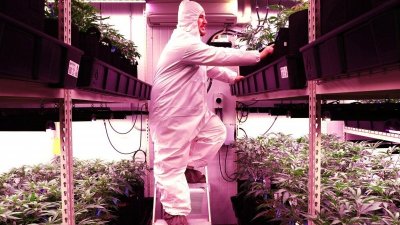1. Cannabis sales will continue to be erratic.
While cannabis companies have been declared essential services in most states where it's legal, hoarding is creating swings in demand. When Massachusetts ordered dispensaries closed, there was a run on stores and over 1,300 applications for medical marijuana cards were made within ten days.
Other states such as California allowed dispensaries to stay open. Denver's mayor initially ordered adult-use marijuana dispensaries closed, but then quickly reversed the order after lines formed creating a health risk.
Changing government policy and consumer fear will continue to cause swings in sales. Coupled with disruptions in the labor force for cultivation, processing, and shipping, cannabis product inventories will be unpredictable for some time to come.
2. Buyer behaviors will change.
Shelter in place and social distancing orders have meant that customers are not going into retail stores. Many dispensaries have moved to curbside pickup. And in states where it is legal, delivery is taking off. Technology companies that provide delivery technology are seeing a huge spike in inquiries as stores scramble to provide this service.
While some consumers will go back to visiting the store to get their weed, many will stick with the ease, convenience, and safety of delivery services long after the crisis has passed. This will also be fueled by stores that see the benefit of marketing to customers with loyalty programs provided through delivery apps.
2. The crisis is driving people to edibles.
As it became clear that Covid-19 affects people with respiratory issues harder than most, consumers have become wary of inhaled products. Vapes, concentrates, and smoked flower sales have flattened or even dropped in some locations while edible and tincture sales have increased.
In addition, orders to shelter in place mean that people are inside with other family members much of the time. Smoking and vaping are being avoided while people remain in close quarters.
While some consumers will go back to inhaled products after the crisis eases, it's likely that some users will likely change behavior permanently as a result of new habits.
3. CBD use is on the rise.
The focus on staying healthy and boosting immune systems is driving consumers to all sorts of health-focused products, and CBD is no exception. While there's a lack of significant clinical research and conclusive data on the health benefits of cannabis products, CBD has clearly been positioned as having several health-related benefits by manufacturers and retailers.
And while CBD stores have not been considered essential businesses, online orders are up significantly. In addition, those brands that distribute through pharmacy and health food stores have remained available to consumers, showing strong sales that will likely continue.
4. Consumers will look to value products.
Over the last year, there has been a glut of high-end premium-priced brands in all cannabis categories and product types. Even before the Covid-19 pandemic, experts have said the top of the market was crowded and not sustainable.
With uncertain economic futures and massive rates of unemployment, consumers will become cost-conscious. This will drive purchases into the value-priced mid-tier categories and even down to the lower price points. Even if we see a strong recovery, consumers will likely stick to budgets for some time.
5. Some businesses won't make it.
While the cannabis market has been booming, it's still a fiercely competitive space with many companies struggling to make it. Many cannabis companies have relied on the capital markets to fund growth. Unfortunately, it's clear that capital markets are going to take a while to recover, leaving many businesses starving for cash. And because THC cannabis is still federally illegal, these companies are not eligible for the PPP and loan programs designed to aid recovery.
In addition, companies were hoping for banking reform to remove the punitive 208e tax code regulations, which will now be pushed into the distant future. Businesses that have overextended themselves will feel the pinch. Expect many of them to go out of business or get bought up by healthier competitors.
While every massive disruption to an economy will cull the herd and put many companies out of businesses, it also creates opportunities. Those who are in a good financial position to weather the storm and who can pivot their business to take advantage of openings will go on to grow quickly and dominate the new industry.
While cannabis companies have been declared essential services in most states where it's legal, hoarding is creating swings in demand. When Massachusetts ordered dispensaries closed, there was a run on stores and over 1,300 applications for medical marijuana cards were made within ten days.
Other states such as California allowed dispensaries to stay open. Denver's mayor initially ordered adult-use marijuana dispensaries closed, but then quickly reversed the order after lines formed creating a health risk.
Changing government policy and consumer fear will continue to cause swings in sales. Coupled with disruptions in the labor force for cultivation, processing, and shipping, cannabis product inventories will be unpredictable for some time to come.
2. Buyer behaviors will change.
Shelter in place and social distancing orders have meant that customers are not going into retail stores. Many dispensaries have moved to curbside pickup. And in states where it is legal, delivery is taking off. Technology companies that provide delivery technology are seeing a huge spike in inquiries as stores scramble to provide this service.
While some consumers will go back to visiting the store to get their weed, many will stick with the ease, convenience, and safety of delivery services long after the crisis has passed. This will also be fueled by stores that see the benefit of marketing to customers with loyalty programs provided through delivery apps.
2. The crisis is driving people to edibles.
As it became clear that Covid-19 affects people with respiratory issues harder than most, consumers have become wary of inhaled products. Vapes, concentrates, and smoked flower sales have flattened or even dropped in some locations while edible and tincture sales have increased.
In addition, orders to shelter in place mean that people are inside with other family members much of the time. Smoking and vaping are being avoided while people remain in close quarters.
While some consumers will go back to inhaled products after the crisis eases, it's likely that some users will likely change behavior permanently as a result of new habits.
3. CBD use is on the rise.
The focus on staying healthy and boosting immune systems is driving consumers to all sorts of health-focused products, and CBD is no exception. While there's a lack of significant clinical research and conclusive data on the health benefits of cannabis products, CBD has clearly been positioned as having several health-related benefits by manufacturers and retailers.
And while CBD stores have not been considered essential businesses, online orders are up significantly. In addition, those brands that distribute through pharmacy and health food stores have remained available to consumers, showing strong sales that will likely continue.
4. Consumers will look to value products.
Over the last year, there has been a glut of high-end premium-priced brands in all cannabis categories and product types. Even before the Covid-19 pandemic, experts have said the top of the market was crowded and not sustainable.
With uncertain economic futures and massive rates of unemployment, consumers will become cost-conscious. This will drive purchases into the value-priced mid-tier categories and even down to the lower price points. Even if we see a strong recovery, consumers will likely stick to budgets for some time.
5. Some businesses won't make it.
While the cannabis market has been booming, it's still a fiercely competitive space with many companies struggling to make it. Many cannabis companies have relied on the capital markets to fund growth. Unfortunately, it's clear that capital markets are going to take a while to recover, leaving many businesses starving for cash. And because THC cannabis is still federally illegal, these companies are not eligible for the PPP and loan programs designed to aid recovery.
In addition, companies were hoping for banking reform to remove the punitive 208e tax code regulations, which will now be pushed into the distant future. Businesses that have overextended themselves will feel the pinch. Expect many of them to go out of business or get bought up by healthier competitors.
While every massive disruption to an economy will cull the herd and put many companies out of businesses, it also creates opportunities. Those who are in a good financial position to weather the storm and who can pivot their business to take advantage of openings will go on to grow quickly and dominate the new industry.




